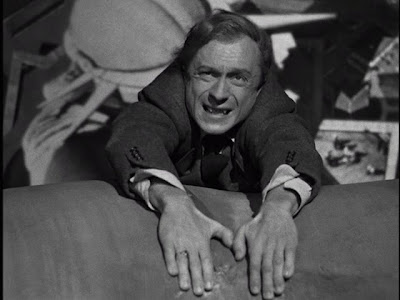 |
| Leonardo DiCaprio and Jonah Hill's characters discuss their legal options. |
Being offended by such things is just silly. First, the punishments administered adhere to the facts of the true-life case, which acknowledge the extensive assistance the defendants gave in making cases against other malefactors. Second, if incarceration and fines comprises your concept of punishment, you need to check your moral compass. Third, people rarely learn and scarcely ever change. Certainly, legal sanctions rarely have the power to instill a genuine sense of right and wrong in a sociopath -- only a surface understanding of what the social expectations are. (To this day, the person on whom DiCaprio's character is based has not made complete payment of the restitution due from his plea deal of 10 years ago.)
One of the things Scorsese does best is make films about closed social groups. Mean Streets, Goodfellas, After Hours, The Age of Innocence, Casino, Gangs of New York, The Departed, Shutter Island all deal with tight-knit communities and the way they can close ranks against outsiders. (Not surprising considering Scorsese's own background. Incidentally, his other great mode is the story of the Loner, also unsurprising when you know how much time he spent alone, sick in bed, as a child. Many spectators have complained that Wolf does not show the damage caused to decent citizens and their financial security by its characters' depredations. The answer is simple -- the film is told from the characters' point-of-view (DiCaprio frequently addresses the audience directly). They had no idea of, nor any concern for, the effect of their actions on anyone else -- that's the nature of a sociopathic personality. It is true, there is no one in the film that expresses moral disdain for what is happening. Even the FBI man played by Kyle Chandler is mostly anxious for the kill, for the success of the hunt, for bringing down the big target, than for rendering justice in any cosmic sense. He's also a career builder, albeit one who is content with his modest means.
Judgment, says Mr. Scorsese, is for you, the audience. If you're not up to that, you may not be up to a Scorsese film.
Incidentally, I had never known Mr. S to be a maestro of slapstick comedy, but the sequence illustrated above, exhibits some of the best physical comedy seen since Peter Sellers's stuntmen retired. Mr. DiCaprio's character has taken an inordinate number of Quaaludes which suddenly take delayed effect, rendering him incapable of walking or talking. The way he slithers into his Lamborghini, opening the gull-wing door with an exquisite scissor-leg move, and then tries to prevent Jonah Hill's character from talking on the bugged telephone, in a slow-motion, rubber-muscled tussle on the floor, can only be compared with this masterpiece:
The 1980s con games in Wolf of Wall Street are relatively crude, especially when compared with CDOs and the other entertaining manipulations of the 2002-2008 period. American Hustle (2013), on the other hand, manages to con even the audience, including your obedient servant, a lifelong Jerseyite, convincing me that the 1970s-era story was shot on my native soil, whereas it was made entirely in Massachusetts (those rapscallions!). Whereas DiCaprio invites you along on the ride, though he lies right to your face, Christian Bale's character would like to keep you and everyone else at arm's length so you can't see how the faux-hair is pasted on under the combover and exactly what is hidden up his sleeve.
 |
| Bradley Cooper adjusts Christian Bale's accoutrements. |
Thusly, the film pulls some remarkable surprises and a full-out concluding con comparable to the finale of The Sting, yet it doesn't seem to be about that. And what's more, unlike Wolf, Hustle toys with your notions of who is the good guy and who is the bad guy and everything in between.
Two slam-dunk predictions, and a few chancier ones. Hustle will be nominated for Costumes (they make a huge contribution to both the atmosphere and in establishing the characters) and for Jennifer Lawrence as Best Supporting Actress. She is truly the new Meryl Streep, in that she disappears into variegated roles, and, I would argue, disappears much more completely into them. Her Rosalyn is rife with telling detail. (No disrespect to Amy Adams, although one wonders why David O. Russell gets work out of her that no other director does. Is that they don't think to ask?) Presuming there will be 10 Best Picture Nominees, Hustle will make the cut (and Wolf probably will, too). Russell will be nominated as director, and the screenplay will be as well.
Beside the dodgy relationships with money, Wolf and Hustle have much in common stylistically. Rapid dolly-in shots and fast cuts, bright colors in the design (especially the retro clothes in both films), nostalgic soundtracks (American Hustle offers some real boomer-bait). But thematically, they part company over the old con-man ethic expressed in the title of this post. Irving Rosenthal, the role played by Christian Bale (who will not be nominated because toward the end of the film he appears to be channeling DeNiro), is a true classic con, who can live with himself morally because he only cheats those who want something for nothing, or an unfair advantage over another person. You Can't Cheat An Honest Man, they say. You take money from those who deserve to be taken. And Rosenthal refuses to hurt the people that matter to him. That puts him 180-degrees diametrically opposed to Jordan Belfont, DiCaprio's character, who has no idea and no concern who he hurts and how. These films live comfortably side by side, yet inhabit totally different moral universes.
But don't take it from me when you can get it from the horse's mouth.




